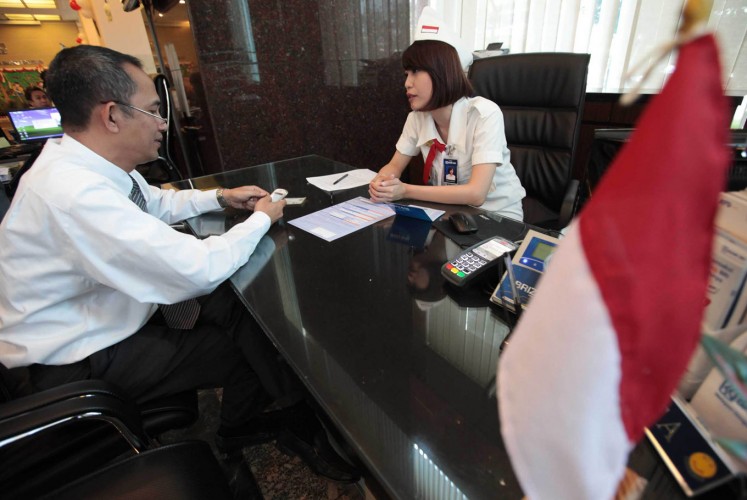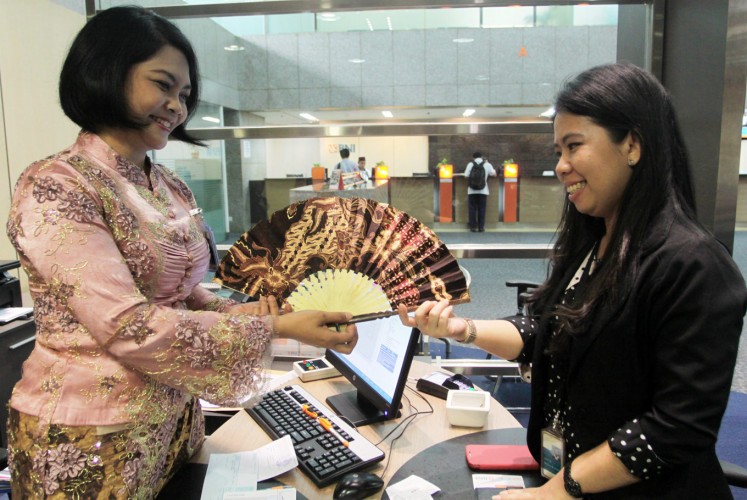Companies strive to help women break glass ceiling
While a number of Indonesian companies have taken action to help women break the glass ceiling, comprehensive intervention for gender equality in the workplace still has a long way to go.
Change Size
 Role model: Facebook chief operating officer Sheryl Sandberg, pictured in a 2016 conference in California, the United States, in this file photo, has stirred enormous public debate through a book she put out in 2013 called Lean In (published by Knopf), encouraging women to pursue their careers and break the glass ceiling. (AFP/Jonathan Leibson)
Role model: Facebook chief operating officer Sheryl Sandberg, pictured in a 2016 conference in California, the United States, in this file photo, has stirred enormous public debate through a book she put out in 2013 called Lean In (published by Knopf), encouraging women to pursue their careers and break the glass ceiling. (AFP/Jonathan Leibson)
T
he path that advertising practitioner Marianne Admardatine has taken toward her latest position as the CEO of J. Walter Thompson Company Indonesia, comprising Mirum and J. Walter Thompson, after having worked for several other advertising consultants, has not been easy.
The highly energetic woman recalled an incident where, years ago, a particular agency she worked for actually withheld her promotion from general manager to managing director upon finding out that she was pregnant with twins.
The company’s management somehow doubted that during her pregnancy and the early days of motherhood she could actually put out the same productivity level as before.
“I insisted to them that I would carry on working while I was pregnant, without lessening my productivity at all,” Marianne told The Jakarta Post recently on the sidelines of the 2018 Indonesian Women’s Forum 2018 organized recently in Jakarta by ceritaperempuan.id, Telkomtelstra and Coca-Cola Amatil Indonesia.
She eventually kept her word as she carried on working until the final month of her pregnancy. The management was impressed.
“I was finally given the promotion. Later that day, I gave birth to my twins,” she said, smiling while reminiscing on the double blessings that had finally entered her life at that time. “It’s unfortunate that many companies still regard pregnancy and motherhood as downsides when it comes to employee productivity.”
Many women, Marianne included, will attest that they often have to work harder than their male counterparts in order to get the recognition they are entitled to, regardless of possessing equal, if not better, competence, due to the gender bias and sexism still prevalent in our society, crippling women’s careers with unfounded assumptions of what they can or cannot do.
This bias has resulted in unequal opportunities for women to enter the workforce, and when they do enter the workforce, a phenomenon called the glass ceiling, defined as an intangible barrier within a hierarchy that prevents women from obtaining upper-level positions.
While gender bias and sexism are often assumed implicitly, their consequences are real. According to data from the Central Statistics Agency (BPS) from February 2017, for instance, while 83.1 percent of all Indonesian men could enter the workforce, only 55 percent of Indonesian women could do so.
According to the World Economic Forum’s 2016 survey involving 144 countries, Indonesia ranks almost rock bottom at 107th position in terms of women’s participation in the formal sector. Globally, only 4 percent of CEOs in the Standard and Poor’s 500 list are women.

Globally, female workers are also paid less than their male counterparts — according to data from United Nations Women, the gender pay gap in the labor force currently amounts to 23 percent. The pay gap will only close in 2086 if current discriminatory and biased practices against women in the workplace continue.
“These numbers speak, so please deal with them proactively,” UN Women program specialist Lily Puspasari said during her presentation.
The women’s playing field is not level from the beginning. “When picking their university majors, women are heavily influenced by prevailing gender social values. Indonesia’s highly collectivistic culture also allows extended family members such as grandparents and uncles to intervene with women’s choice of university majors,” she lamented.
For instance, popular stereotype holds that women should not enroll in engineering school in university because of the “masculine” connotation of that particular field.
The consequence of this bias eventually makes its way into the workforce: according to 2016 data from McKinsey & Company’s women in the workplace survey, women also encounter more barriers when attempting to enter a number of stereotypically masculine jobs.
The survey revealed that while services, food and beverage as well as communications sectors are relatively more balanced in terms of gender composition, fields such as telecommunications, engineering and information technology are still heavily male dominated.
Eventually, society’s sexism also permeates to company policies, depriving women from essential facilities such as a nursing room, daycare center as well as adequate maternal and paternal leave periods.
Lily said this was unfortunate as a number of research studies — including one from McKinsey and Company — had actually strengthened the evidence that increased female engagement in the workplace as well as company policies favoring gender equality could actually boost a company’s overall productivity and retention rate.
“Women leaders typically come up with policies that are inclusive and concerned about employees’ overall well-being, thereby increasing retention rate and decreasing recruitment costs. When employees feel that they are worthy assets, they will put out more energy and effort into their work, making them more productive,” she argued.
Recognizing this fact, a number of corporations in Indonesia have launched a number of programs to help women break the glass ceiling. The programs comprise numerous methods, from the provision of necessary facilities and allowances to trainings.

According to Telkomtelstra president director Erik Meijer, for example, starting from 2016 his company — a joint venture between state-owned telecommunications company PT Telekomunikasi Indonesia and Telstra Corporation Limited — has included a number of policies to support women’s career advancements.
The policies included equal promotion opportunities and a paternal leave of two weeks to allow fathers to participate in their newborn’s caretaking, Erik said.
“Unfortunately, we don’t have enough female human capital, so we look forward to cooperating with the education sector to encourage more women to enroll in engineering school,” he said.
Coca-Cola Amatil Indonesia group chief of information Deborah Intan Nova, meanwhile, said her company finally moved into affirmative action supporting women’s careers upon hitting a management problem in 2014.
“A company survey had revealed that the problem lied with, among other factors, very low engagement among our female employees, which amounted to only 47 percent. To overcome this problem, the company has been committed to increasing female employee engagement through leadership training,” she explained.
According to Deborah, the leadership training, which is exclusively designated for female employees, seeks to boost their confidence to take on new challenges and promotions, while encouraging women to work in male-dominated divisions such as the sales team as well as operations and manufacturing.
She claimed that the programs eventually increased women’s participation in the company’s male-dominated tasks.
“In 2014, for example, almost none of our salespeople nationwide were women. Now, around 18 percent of our sales supervisors are women,” she said.
PT AIG Insurance Indonesia (AIG Indonesia) has also created a number of programs seeking to advance women’s careers further.
AIG Indonesia general counsel and corporate secretary Fifi Kusumawati, for example, said she was lucky to work in the service industry, a sector which is fairly gender-balanced and has more female workers.
“One-third of our middle management comprises men, while the remaining two-thirds comprise women,” she said, adding that she had been greatly helped by the company’s training seeking to help women become more confident in themselves, especially when speaking up in public.
She added that the company also allowed its employees to bring their children along to work. Sometimes, the company even created events that engaged employees’ children, helping workers integrate their work and family life.
Despite the company’s initiatives, unfortunately, the endeavor to advance women’s corporate careers in Indonesia is still a steep hill to climb.
According to Erik, for example, his company still struggles to increase women’s participation in male-dominated technical divisions, which currently is only 17 percent female. The company’s newly established two-week paternal leave package, meanwhile, is still short of meeting UN Women’s ideal standard of two months.
Many Indonesian companies also find it hard to fulfill the UN Women’s four-month ideal standard of maternal leave.
Indonesia Chamber of Commerce of Industry (KADIN) Women Empowerment division vice chairwoman Nita Yudhi said the most difficult obstacle to Indonesian women’s career advancement was Indonesia’s highly patriarchal culture. Most people attending the forum, including Marianne, nodded their heads in agreement with her.
Nita, who is also the chairwoman of the Indonesian Female Entrepreneurs Association, added that gender socialization had also turned women into passive individuals who were doubtful about their abilities.
According to Lily, given Indonesia’s strong and enduring patriarchal culture, which runs deep in all aspects of society’s life, to increase women’s participation in the workforce and advance their careers, numerous stakeholders must cooperate to undergo a holistic intervention program covering national political-economic policies and cultural aspects.
Telkomtelstra chief financial officer Ernest Hutagalung also encouraged his male counterparts to support women’s career advancement in the corporate sector. His support for the cause has come from a personal place.
“I have a daughter who now studies in college, and I have become aware that I want her to become a leader in her sector as well,” he said.









